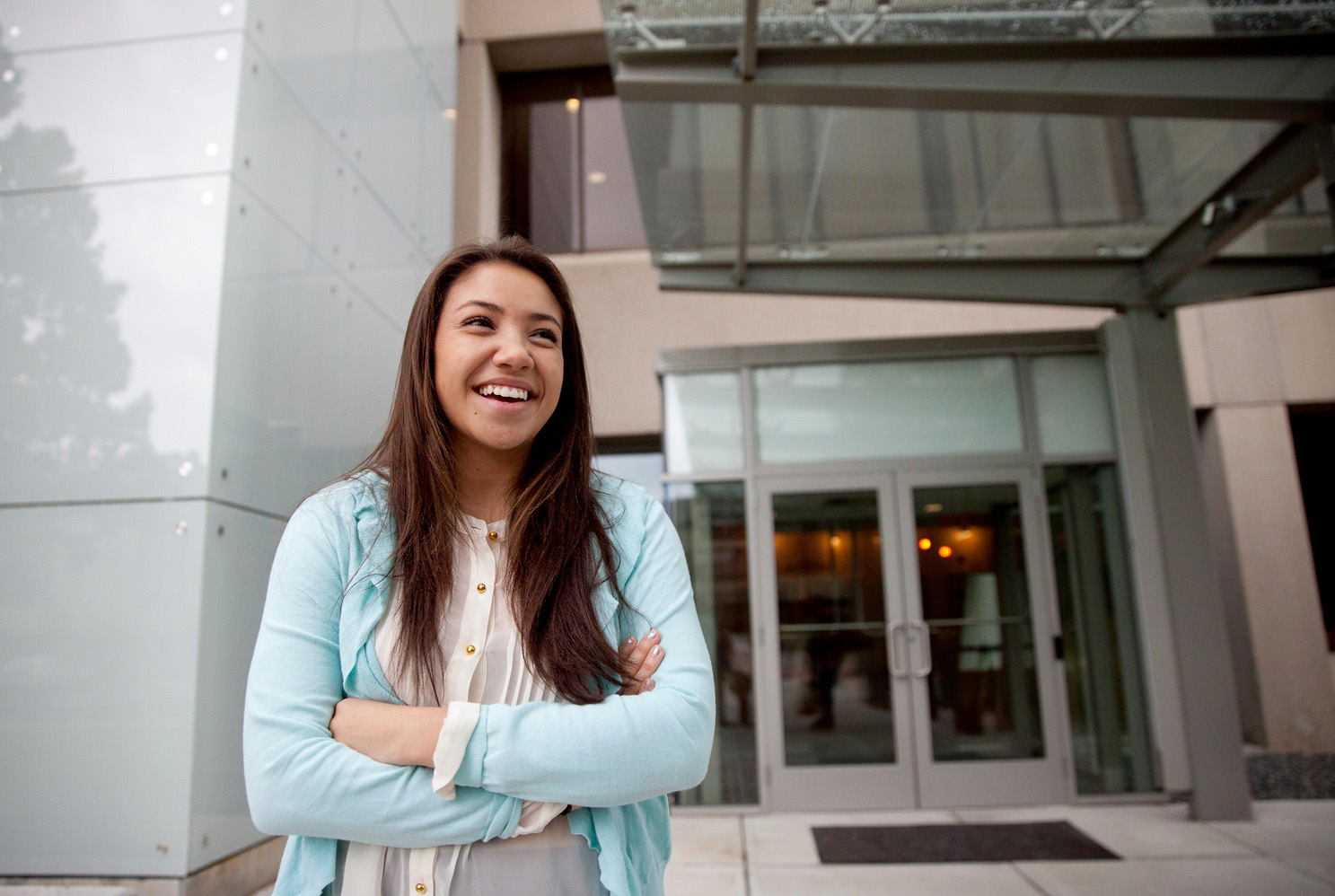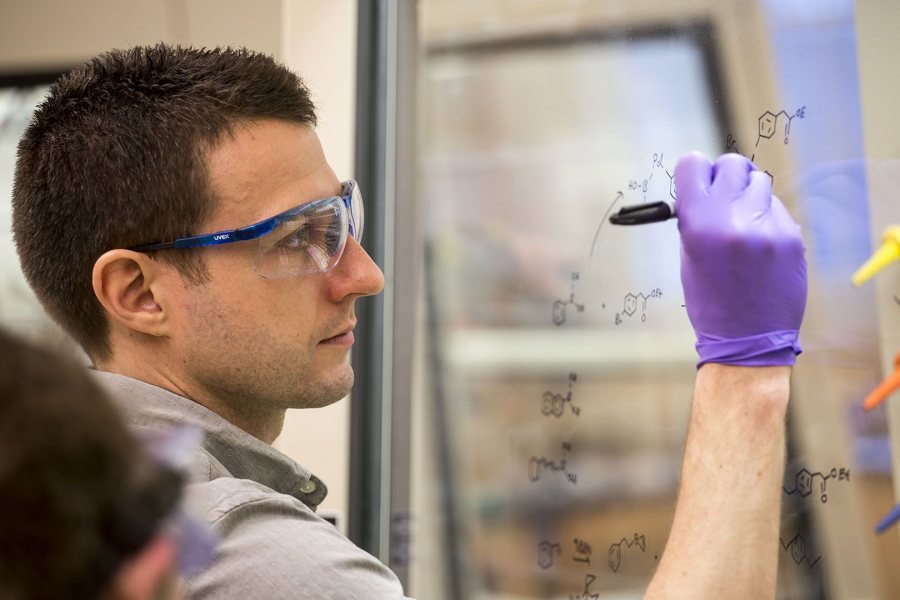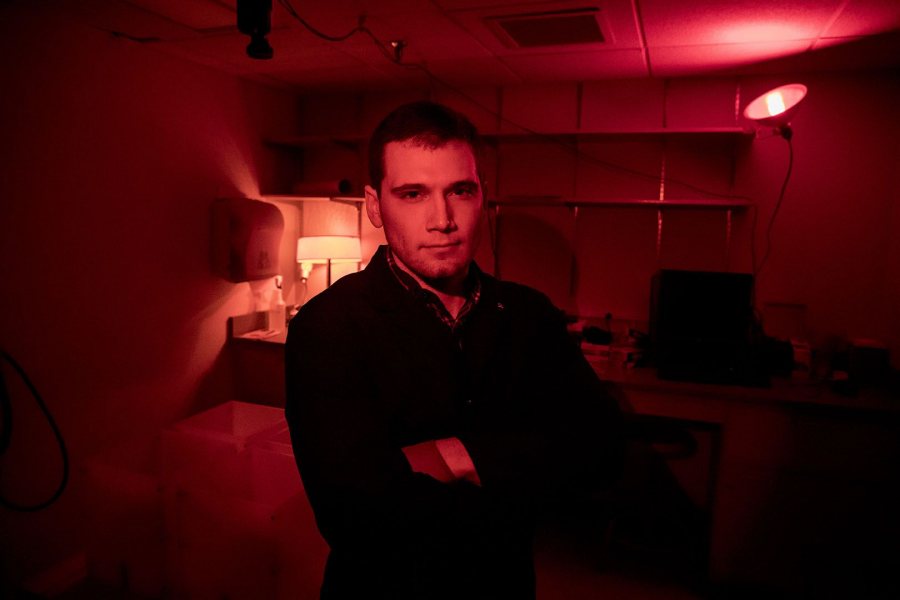
As an English major, I can guarantee that I won’t be called upon to inject a drug into a mouse brain. But for neuroscience honors candidate Alex Gogliettino ’17 of Branford, Conn., that’s a basic skill.
Already accepted into doctoral programs in neuroscience for next year, Gogliettino has spent hundreds of hours in a Bates lab using a mouse model to analyze and interpret a possible treatment for an exceptionally rare autism-spectrum disorder in humans.
In preparation for his honors thesis research, he spent the past two summers working at Yale University in the lab of Dr. Marc Potenza, receiving support from a Bates Summer Research Fellowship and the Kelsey Prize for Neuroscience Research, named for Professor Emeritus of Psychology John Kelsey.
This year, he’s brought all his Bates training to bear on his thesis, “DNA Methylomics: Targeting TET1 as a Treatment for Intellectual Disability,” and as he explained it to me, this was my immediate thought: This is important, and I need to know more.
When somebody asks you about your thesis, what’s your elevator speech?
My adviser and I are basically knocking down a protein — that is, blocking it from being made in the brain — to try to enhance learning and memory in mice that have been genetically modified to have a certain intellectual disability.
The protein is the one in my thesis title: TET1, or “Ten-eleven translocation methylcytosine dioxygenase 1.”
We are also trying to better understand the molecular mechanisms that underpin learning and memory.
How do you make what you write accessible to students, like me, who are not in STEM fields?
That’s one of the biggest challenges in science: Communicating to individuals who are not necessarily involved in science what exactly you are doing.
My actual thesis delves deeply into the molecular biology, but in the first few pages I discuss what this topic means to me personally and how it is addressing a societal issue and a pressing biomedical issue, intellectual disability. I explain why I’m intrigued by it.
And why are you intrigued by it?
OK, this gets pretty philosophical. Humans have the capacity to recall just crazy amounts of detail from earlier parts of our lives. And that capacity really is what makes us who we are. We are what we can remember about our past. That’s just crazy, and it’s just a unique, really interesting puzzle.
And also, there are diseases of the brain, like Alzheimer’s and many others, where individuals can’t do that. And in rare disorders like the one I am studying, Pitt-Hopkins Syndrome, they have impaired language and memory function.
Can you go into a little more detail about Pitt Hopkins?
Individuals with this disease are missing a functional copy of a single gene known as Transcription Factor 4.
Pitt Hopkins is an extremely rare disease. There are only about 500 people in the world that we know of. Individuals with Pitt Hopkins Syndrome often do not develop language — spoken or sign.
My project is based on Pitt Hopkins research being done at Bates by my thesis adviser, Andrew Kennedy. We think one of the reasons is a disruption in their capacity for verbal memory.
How is your relationship with your adviser, Andrew Kennedy?
He’s new, and I didn’t really meet him until this year.
Last year, I was taking a neuroscience class, and my professor, Nancy Koven, was saying how Bates was hiring a new professor and we should go to the research talk that each candidate gives. I went and I thought that he was asking really interesting questions about learning and memory.
So I just emailed him, a cold email saying, “I would love to work with you.” He emailed me back and said, “That would be cool. Here are the projects that you can work on.”

Alex Gogliettino’s thesis adviser is Assistant Professor of Chemistry Andrew Kennedy, shown teaching an organic chemistry lab on Feb. 9, 2017, in Dana Chemistry Hall. (Josh Kuckens/Bates College)
I really like working with him. He’s always available through email, phone, etc. He’s only 33 and has just finished his post-doc so he knows what’s like to be an undergrad.
More important, he also went to a small college, Providence College, so he knows what the relationship between a small-college professor and a student is. He really cares and understands that this whole thing is a learning experience.
What is your thesis routine?
The most important part was to make sure I familiarized myself with the literature, so I started reading last May. That’s probably one of the hardest parts of a project like this: wrapping your head around what is actually happening in the field, where the barriers to new knowledge are, and what we know vs. what we don’t know. That is a really important part of science.
Last semester, almost every morning from around 9 to 12, I would write. I would have the most energy in the morning, and writing is very taxing, that’s the best time for me.
The spot where I wrote really didn’t matter. I would just go somewhere I was comfortable and could work for three hours. It would depend. I would mix it up. First floor of the library sometimes. Then the third floor, then the second floor. And sometimes in my room at my desk.
Was going through the literature daunting?
When you start familiarizing yourself with the field, the first pieces of literature you are going to read are pretty intense. Honestly, reading a scientific paper in an unfamiliar field takes about five hours to go through. You’ve got to just take your time and start as early as you possibly can.
I started out with reading review articles, which are not necessarily studies per se, but are reviewing the literature. They give you a scope of the field. They give you perspective, help you familiarize yourself with the jargon and, again, tell you what’s known and what’s not known about the field.
And once I started to get a feel for that, I started delving deep into the hard-core research papers. It was daunting, a little bit, but I would just take my time.
What has been most enjoyable about working on your senior thesis?
The most interesting part are the questions we are asking about our ability to recall things from the past, and how that fits into the bigger picture of understanding how the brain gives rise to consciousness. That is the coolest part.
The most difficult?
I think the most difficult part is that this work is technically difficult and very time-consuming. That’s not negative, just challenging.
Working with animals requires a good amount of dexterity and injecting drugs into a mouse brain is pretty hard. In the grand scheme of cognitive neurobiology research, it’s pretty simple surgery, but at the undergraduate level it is probably one of the most challenging things that I would do.

Neuroscience major Alex Gogliettino ’17 of Branford, Conn., poses in a Carnegie Science Hall laboratory on Feb. 28, 2017. The red light helps create a calm environment for the lab’s work with mice. Since mice cannot see red light, they behave as they would in their preferred, darkened environment. (Josh Kuckens/Bates College)
Also, another component of my thesis involves working with big data and doing computer-science work, so I had to teach myself a lot of computer science stuff, too. That was tough and challenging, but you grow and learn a lot from it.
What advice would you give to your younger self?
Especially with lab theses, there is only a certain amount of control when you run the experiments. And there is a lot of stuff you can’t control. That is just going to happen.
One of the most important parts of doing thesis, and being involved with science at all, is just understanding that nothing is ever going to be perfect. You are going to mess up and you are going to fail. But don’t be discouraged or shy away from that. Just learn from your mistakes and move on. Be a little too optimistic at times because you need that positive energy to keep going, because there will be a lot of roadblocks to be found, but you can overcome them.
Plans for next year?
I hope to continue doing neuroscience research for the next five years, at least.
I’ve been accepted to a couple neuroscience Ph.D. programs, at Washington University and Vanderbilt, and am heading to Stanford for interviews this week.
I have the potential opportunity to work with a professor who advised Professor Kennedy, doing the same sort of work at a research university that we’re doing here at Bates.
Interviews are just a great time to talk science with professors and be immersed in an environment where everyone is as passionate about studying neuroscience as you are.



